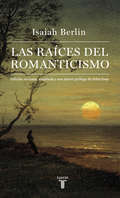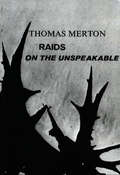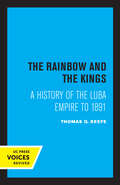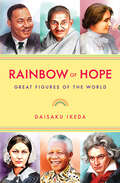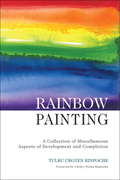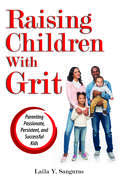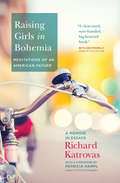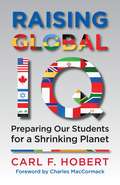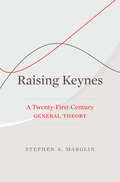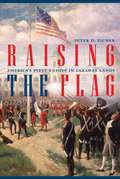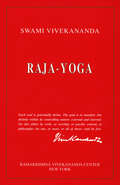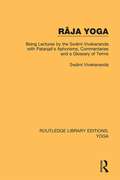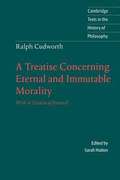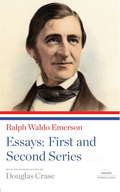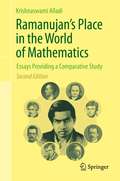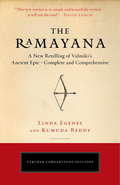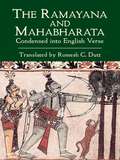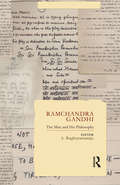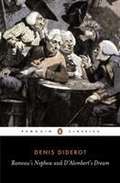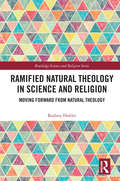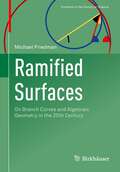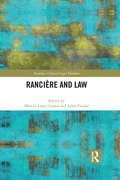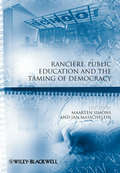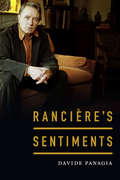- Table View
- List View
Las raíces del romanticismo
by Isaiah BerlinLos orígenes de un movimiento, el romanticismo, que transformó para siempre nuestra manera de pensar, por uno de los grandes historiadores de las ideas. Taurus recupera este valioso texto, en el que Isaiah Berlin demuestra cómo la irrupción del romanticismo supuso el cambio de mayor envergadura en la conciencia de Occidente a lo largo de los siglos XIX y XX. El resto de corrientes que surgieron durante el período no solo fueron menos relevantes sino que, además, estaba profundamente influenciadas por este. Berlin, uno de los principales historiadores de las ideas del siglo XX, fue el primer intelectual en poner de manifiesto la enorme importancia de este movimiento, una nueva forma de pensar en la que yo no se asume que para cada una de las grandes preguntas no hay una única gran respuesta, y que por lo tanto puede darse el conflicto de valores. Las raíces del romanticismo traza el desarrollo de este desde su despertar en el siglo XVIII, las causas que llevaron a semejante transformación, hasta su desenfrenada apoteosis, y analiza su legado, que pervive de manera profunda no sólo en el pensamiento contemporáneo sino también en movimientos políticos como en nacionalismo. «Mi interés por el romanticismo no es meramente histórico. Muchos fenómenos que vivimos hoy en día -el nacionalismo, el existencialismo, la democracia, el totalitarismo- se ven profundamente afectados por el romanticismo, que los penetra a todos.»Isaiah Berlin
Raids on the Unspeakable
by Thomas MertonThis collection of his prose writings reveals the extent to which Thomas Merton moved from the other-worldly devotion of his earlier work to a direct, deeply engaged, often militant concern with the critical situation of man in the world. Here this concern finds expression in poetic irony and in meditations intentionally dour. In these brief, challenging pieces, Father Merton does not offer consolation or easy remedies. He looks candidly and without illusions at the world of his time. Though he sees dark horizons, his ultimate answer is one of Christian hope. To vary the perspective, he writes in many forms, using parable and myth, the essay and the meditation, satire and manifesto, prose poetry and even adaptations from a medieval Arab mystic (Ibn Abbad) to humanize and dramatic his philosophical themes. The themes of Raids on the Unspeakable are as old as the myths of Prometheus and Atlas, and as timely as the human evils of today. They range from the "Message" written for an international congress of poets to the beautiful yet disturbing Christmas meditation, "The Time of the End Is the Time of No Room." And there are essays inspired by the world of three significant contemporary writers: Flannery O'Connor, the French novelist Julien Green, and the playwright Eugene Ionesco. A number of Father Merton's own drawings are also included in the book--not as "illustrations," but as "signatures" or :"abstract writings," which stand in their own right as another personal statement.
The Rainbow and the Kings: A History of the Luba Empire to 1891
by Thomas Q. ReefeThis title is part of UC Press's Voices Revived program, which commemorates University of California Press’s mission to seek out and cultivate the brightest minds and give them voice, reach, and impact. Drawing on a backlist dating to 1893, Voices Revived makes high-quality, peer-reviewed scholarship accessible once again using print-on-demand technology. This title was originally published in 1981.
Rainbow of Hope: Great Figures of the World
by Daisaku Ikeda"No rain, no rainbows." Good things come when you win over obstacles. And great people all over the world have faced and overcome all kinds of hardships. No rain or storm could defeat them because rainbows of hope always shone in their hearts. In these delightful essays world-renowned Buddhist philosopher, educator, and peace activist Daisaku Ikeda speaks to children of his hopes for their future and offers lessons he's learned about these great people from East and West.
Rainbow Painting
by Kerry Moran Tulku Urgyen Rinpoche Marcia Binder Schmidt Erik Pema KunsangRainbow Painting is saturated with direct, pithy instruction, the very quintessence of the Buddhist Spiritual approach. Tulku Urgyen Rinpoche speaks from experience, expressing what he himself has undergone, instructing us in the way we should train in a complete and unmistaken manner. We come to understand that to become enlightened we must experience what was always present within us. The ultimate object of realization, the natural state of mind, unmistakenly and exactly as it is, need not be sought for elsewhere but is present within ourselves. Stability in this unexcelled state of unity is not attained independently of means, proper conduct and knowledge of the view. We should unite view and conduct; and this book contains the key points for doing just that."Some people have the habit of thinking that something is bound to happen after practicing meditation a while - like going through school - that after ten or fifteen years you end up with a degree. That's the idea in the back of people's minds: "I can make it happen! I can do enlight¬enment!" Not in this case, though. You cannot make enlightenment, because enlightenment is unconstructed. Realizing the awakened state is a matter of being diligent in allowing nondual awareness to regain its natural stability. It is difficult to reach enlightenment without such dili¬gence, without undertaking any hardship."---Tulku Urgyen Rinpoche"Tulku Urgyen Rinpoche is someone who has lived at length in mountain hermitages, spent many years in retreat, and done a considerable amount of meditation training. For this reason, he gives the very quintessence of the sacred Dharma spoken by our compassionate Buddha Shakyamuni. He speaks from experience, expressing what he himself has undergone, instructing us in the way we should practice in a complete and unmistaken manner. These teachings, saturated with direct, pithy instruction, are unique."---Chökyi Nyima RinpocheThe ultimate object of realization, the natural state of mind, unmistakenly and exactly as it is, need not be sought elsewhere than in ourselves. We become enlightened through experiencing what is always innately present. Stability in this unexcelled unawareness is attained when view, the knowledge aspect and conduct, the means are integrated. In Rainbow Painting, Tulku Urgyen Rinpoche presents the practices to accomplish this unity.
Rainbow Painting: A Collection of Miscellaneous Aspects of Development and Completion
by Chokyi Nyima Erik Pema Kunsang Tulku UrgyenSaturated with direct, pithy instructions, Rainbow Painting presents the very quintessence of the Buddhist Spiritual approach through the authentic personal experience of one of the greatest living meditation masters.Tulku Urgyen Rinpoche expresses what he himself has undergone, instructing us in a complete manner of training. To attain enlightenment we must experience our innate nature. The ultimate object of realization, the natural state of mind, unmistakenly and exactly as it is, need not be sought for elsewhere but is present within ourselves. Stability in this unexcelled state of unity is not achieved by separating what we know from what we do.This book contains astute instructions that address these key points of spirituality.From the Trade Paperback edition.
Raising Children With Grit: Parenting Passionate, Persistent, and Successful Kids
by Laila SangurasGrit, the combination of passion and perseverance, has more of an influence on success than cognitive ability, and parents want nothing more than to raise happy, successful children. Raising Children With Grit: Parenting Passionate, Persistent, and Successful Kids provides the strategies that parents need to teach, motivate, and inspire children to pursue their passions with grit—and succeed. By focusing on self-discipline, parenting strategies, and personality traits, parents can cultivate perseverance in their children. By coupling that with an emphasis on curiosity and interest-building activities, parents can help their children define their passions. Additionally, this book offers tips for parents about working with school personnel, how to model grit in their own lives, and how social factors can influence the development of grit.
Raising Girls in Bohemia
by Richard KatrovasA provocative collection of personal and political essays by an American writer, Raising Girls in Bohemia chronicles the life of a father raising three perfectly bilingual, culturally bifurcated, Czech-American daughters. While tracing what fatherhood has taught him about the world, Katrovas delves into a range of intricately related yet far-flung subjects including fine dining, sexual epithets, gender identity, racism, poetry, and education, tracing the contours of his ignorance about all things. Through the course of these fine essays, Katrovas unveils what it means to be an American and to be a man, and especially what it means to be a father of three daughters, born in Prague, in what we can only hope is the twilight of patriarchy.
Raising Global IQ: Preparing Our Students for a Shrinking Planet
by Carl HobertA groundbreaking roadmap for improving global literacy and conflict-resolution skills in middle and high schools across the United States In Raising Global IQ, Carl Hobert calls on K-12 teachers, administrators, parents, and students alike to transform the educational system by giving students the tools they need to become responsible citizens in a shrinking, increasingly interdependent world. Drawing on his nearly thirty years teaching, developing curricula, and leading conflict-resolution workshops here and around the world, he offers creative, well-tested, and understandable pedagogical ideas to help improve our children's GIQ-- Global Intelligence Quotient. Cognizant of many U.S. schools' limited budgets and time, Hobert advocates teaching foreign languages early in life, honing students' conflict-resolution skills, providing creative-service learning opportunities, and offering cultural-exchange possibilities in students' own communities, as well as nationally and abroad--all before they graduate from high school.
Raising Keynes: A Twenty-First-Century General Theory
by Stephen A. MarglinBack to the future: a heterodox economist rewrites Keynes’s General Theory of Employment, Interest, and Money to serve as the basis for a macroeconomics for the twenty-first century.John Maynard Keynes’s General Theory of Employment, Interest, and Money was the most influential economic idea of the twentieth century. But, argues Stephen Marglin, its radical implications were obscured by Keynes’s lack of the mathematical tools necessary to argue convincingly that the problem was the market itself, as distinct from myriad sources of friction around its margins.Marglin fills in the theoretical gaps, revealing the deeper meaning of the General Theory. Drawing on eight decades of discussion and debate since the General Theory was published, as well as on his own research, Marglin substantiates Keynes’s intuition that there is no mechanism within a capitalist economy that ensures full employment. Even if deregulating the economy could make it more like the textbook ideal of perfect competition, this would not address the problem that Keynes identified: the potential inadequacy of aggregate demand.Ordinary citizens have paid a steep price for the distortion of Keynes’s message. Fiscal policy has been relegated to emergencies like the Great Recession. Monetary policy has focused unduly on inflation. In both cases the underlying rationale is the false premise that in the long run at least the economy is self-regulating so that fiscal policy is unnecessary and inflation beyond a modest 2 percent serves no useful purpose.Fleshing out Keynes’s intuition that the problem is not the warts on the body of capitalism but capitalism itself, Raising Keynes provides the foundation for a twenty-first-century macroeconomics that can both respond to crises and guide long-run policy.
Raising the Flag: America's First Envoys in Faraway Lands
by Peter EicherSince its inception the United States has sent envoys to advance American interests abroad, both across oceans and to areas that later became part of the country. Little has been known about these first envoys until now. From China to Chile, Tripoli to Tahiti, Mexico to Muscat, Peter D. Eicher chronicles the experience of the first American envoys in foreign lands. Their stories, often stranger than fiction, are replete with intrigues, revolutions, riots, war, shipwrecks, swashbucklers, desperadoes, and bootleggers. The circumstances the diplomats faced were precursors to today’s headlines: Americans at war in the Middle East, intervention in Latin America, pirates off Africa, trade deficits with China. Early envoys abroad faced hostile governments, physical privations, disease, isolation, and the daunting challenge of explaining American democracy to foreign rulers. Many suffered threats from tyrannical despots, some were held as slaves or hostages, and others led foreign armies into battle. Some were heroes, some were scoundrels, and many perished far from home. From the American Revolution to the Civil War, Eicher profiles the characters who influenced the formative period of American diplomacy and the first steps the United States took as a world power. Their experiences combine to chart key trends in the development of early U.S. foreign policy that continue to affect us today. Raising the Flag illuminates how American ideas, values, and power helped shape the modern world.
Raja-Yoga
by Swami Nikhilananda Swami VivekanandaRaja-Yoga describes the methods of spiritual concentration, meditation, and psychic development.
Râja Yoga: Being Lectures by the Swâmi Vivekananda, with Patanjali's Aphorisms, Commentaries and a Glossary of Terms (Routledge Library Editions: Yoga #7)
by Swâmi VivekanandaThis book, first published in 1922, examines the science of Râja Yoga. All the orthodox systems of Indian philosophy point to one goal, the liberation of the soul through perfection – and the method to attain this is through Yoga. This book presents lectures on Yoga, delivered to a western audience view to explaining Indian philosophy; the lectures are accompanied by the Sutras (aphorisms) of Patanjali, along with an explanatory commentary.
Ralph Cudworth: A Treatise Concerning Eternal And Immutable Morality - With A Treatise Of Freewill
by Ralph Cudworth Sarah Hutton Karl Ameriks Desmond M. ClarkeRalph Cudworth (1617-1688) deserves recognition as one of the most important English seventeenth-century philosophers after Hobbes and Locke. In opposition to Hobbes, Cudworth proposes an innatist theory of knowledge which may be contrasted with the empirical position of his younger contemporary Locke, and in moral philosophy he anticipates the ethical rationalists of the eighteenth century. A Treatise Concerning Eternal and Immutable Morality is his most important work, and this volume makes it available, together with his shorter Treatise of Freewill, with a historical introduction, a chronology of his life, and an essay on further reading.
Ralph Waldo Emerson: First and Second Series
by Douglas Crase Ralph Waldo Emerson"Emerson's prose is his triumph, both as eloquence and as insight. After Shakespeare, it matches anything else in the language." -Harold BloomHere are Ralph Waldo Emerson's classic essays, including the exhortation to "Self-Reliance," the embattled realizations of "Circles" and "Experience," and the groundbreaking achievement of "Nature." Our most eloquent champion of individualism, Emerson acknowledges at the same time the countervailing pressures of society in American life. Even as he extols what he calls "the great and crescive self," he dramatizes and records its vicissitudes. Also gathered here are his wide-ranging discourses on history, art, politics, friendship, love, and much more. For almost thirty years, The Library of America has presented America's best and most significant writing in acclaimed hardcover editions. Now, a new series, Library of America Paperback Classics, offers attractive and affordable books that bring The Library of America's authoritative texts within easy reach of every reader. Each book features an introductory essay by one of a leading writer, as well as a detailed chronology of the author's life and career, an essay on the choice and history of the text, and notes. The contents of this Paperback Classic are drawn from Ralph Waldo Emerson: Essays and Lectures, volume number 15 in the Library of America series. It is joined in the series by three companion volumes, gathering Emerson's poems, translations, and selections from his journals.From the Trade Paperback edition.
Ramanujan's Place in the World of Mathematics: Essays Providing a Comparative Study
by Krishnaswami AlladiThe First Edition of the book is a collection of articles, all by the author, on the Indian mathematical genius Srinivasa Ramanujan as well as on some of the greatest mathematicians in history whose life and works have things in common with Ramanujan. It presents a unique comparative study of Ramanujan’s spectacular discoveries and remarkable life with the monumental contributions of various mathematical luminaries, some of whom, like Ramanujan, overcame great difficulties in life. Also, among the articles are reviews of three important books on Ramanujan’s mathematics and life. In addition, some aspects of Ramanujan’s contributions, such as his remarkable formulae for the number pi, his path-breaking work in the theory of partitions, and his fundamental observations on quadratic forms, are discussed. Finally, the book describes various current efforts to ensure that the legacy of Ramanujan will be preserved and continue to thrive in the future.This Second Edition is an expanded version of the first with six more articles by the author. Of note is the inclusion of a detailed review of the movie The Man Who Knew Infinity, a description of the fundamental work of the SASTRA Ramanujan Prize Winners, and an account of the Royal Society Conference to honour Ramanujan’s legacy on the centenary of his election as FRS.
The Ramayana: A New Retelling of Valmiki's Ancient Epic--Complete and Comprehensive
by Kumuda Reddy Linda EgenesA delightfully straightforward and lyrical retelling of the ancient Indian epic of loyalty, betrayal, redemption, and insight into the true nature of life -- one of history's most sacred ethical works, rendered with completeness and sterling accuracy for the modern reader.Here is one of the world's most hallowed works of sacred literature, the grand, sweeping epic of the divine bowman and warrior Rama and his struggles with evil, power, duplicity, and avarice. The Ramayana is one of the foundations of world literature and one of humanity's most ancient and treasured ethical and spiritual works. Includes an introduction by scholar Michael Sternfeld. From the Trade Paperback edition.
The Ramayana and Mahabharata: Condensed into English Verse
by Romesh C. DuttLike ancient Greece, India claims two great epics: the Ramayana, recounting the adventures of a banished prince who wanders for years in the wilderness of southern India, bears a resemblance to the Odyssey; the Mahabharata, based on the legends surrounding a war in which all the warlike races of Northern India took part, is the country's Iliad. Together, the two represent the epic literature of the ancient Hindus, offering latter-day readers the most realistic image of the civilization and culture of India 3,000 years ago — its political and social life as well as its religion and philosophy.The Ramayana portrays domestic and religious life, with vignettes of tenderness, endurance, and devotion. The Mahabharata depicts the political climate of ancient India, with tales of valor and heroism, ambition, and chivalry. This condensed version of these extremely long tales features selection from cantos that convey the leading incidents of the epic, linking them with short notes. Readers seeking a practical knowledge of these magnificent works within a reasonable compass can do no better than this convenient and poetic translation.
Ramchandra Gandhi: The Man and His Philosophy
by A. RaghuramarajuRamchandra Gandhi, famous for his rich and varied interests, left behind a large corpus of writings, both philosophical and non-philosophical. Introducing the readers to the creative Indian philosopher, this volume highlights the principal thrust of his works, critically locates them within the larger political, philosophical, literary and socio-cultural context, and accounts for his lasting influence. For the first time, essays on Ramchandra Gandhi’s earlier works and later writings have been brought together to take stock of his contribution to contemporary Indian thought as a whole. Written by philosophers as well as those belonging to literature and the social sciences, the essays record his experimental ventures both in form and content, and shed light on key themes in language, communication, religion, aesthetics, spirituality, consciousness, self, knowledge, politics, ethics, and non-violence. The book will appeal to those in philosophy, political science, history, sociology, literature, and Gandhian studies.
Rameau's Nephew and D'Alembert's Dream: Translated with Introductions by Leonard Tancock
by Denis DiderotIn Rameau's Nephew, the eccentric and foolish nephew of the great composer Jean-Philippe Rameau meets Diderot by chance, and the two embark on a hilarious consideration of society, music, literature, politics, morality and philosophy.
Ramified Natural Theology in Science and Religion: Moving Forward from Natural Theology (Routledge Science and Religion Series)
by Rodney HolderThis book offers a rationale for a new ‘ramified natural theology’ that is in dialogue with both science and historical-critical study of the Bible. Traditionally, knowledge of God has been seen to come from two sources, nature and revelation. However, a rigid separation between these sources cannot be maintained, since what purports to be revelation cannot be accepted without qualification: rational argument is needed to infer both the existence of God from nature and the particular truth claims of the Christian faith from the Bible. Hence the distinction between ‘bare natural theology’ and ‘ramified natural theology.’ The book begins with bare natural theology as background to its main focus on ramified natural theology. Bayesian confirmation theory is utilised to evaluate competing hypotheses in both cases, in a similar manner to that by which competing hypotheses in science can be evaluated on the basis of empirical data. In this way a case is built up for the rationality of a Christian theist worldview. Addressing issues of science, theology and revelation in a new framework, this book will be of keen interest to scholars working in Religion and Science, Natural Theology, Philosophy of Religion, Biblical Studies, Systematic Theology, and Science and Culture.
Ramified Surfaces: On Branch Curves and Algebraic Geometry in the 20th Century (Frontiers in the History of Science)
by Michael FriedmanThe book offers an extensive study on the convoluted history of the research of algebraic surfaces, focusing for the first time on one of its characterizing curves: the branch curve. Starting with separate beginnings during the 19th century with descriptive geometry as well as knot theory, the book focuses on the 20th century, covering the rise of the Italian school of algebraic geometry between the 1900s till the 1930s (with Federigo Enriques, Oscar Zariski and Beniamino Segre, among others), the decline of its classical approach during the 1940s and the 1950s (with Oscar Chisini and his students), and the emergence of new approaches with Boris Moishezon’s program of braid monodromy factorization.By focusing on how the research on one specific curve changed during the 20th century, the author provides insights concerning the dynamics of epistemic objects and configurations of mathematical research. It is in this sense that the book offers to take the branch curve as a cross-section through the history of algebraic geometry of the 20th century, considering this curve as an intersection of several research approaches and methods. Researchers in the history of science and of mathematics as well as mathematicians will certainly find this book interesting and appealing, contributing to the growing research on the history of algebraic geometry and its changing images.
Ranciere and Law (Nomikoi: Critical Legal Thinkers)
by Monica Lopez Lerma Julen EtxabeThis book is the first to approach Jacques Rancière’s work from a legal perspective. A former student of Louis Althusser, Rancière is one of the most important contemporary French philosophers of recent decades: offering an original and path-breaking way to think politics, democracy and aesthetics. Rancière’s work has received wide and increasing critical attention, but no study exists so far that reflects on the wider implications of Rancière for law and for socio-legal studies. Although Rancière does not pay much specific attention to law—and there is a strong temptation to identify law with what he terms the "police order"—much of Rancière’s historical work highlights the creative potential of law and legal language, with important legal implications and ramifications. So, rather than excavate the Rancièrean corpus for isolated statements about the law, this volume reverses such a method and asks: what would a Rancière-inspired legal theory look like? Bringing together specialists and scholars in different areas of law, critical theory and philosophy, this rethinking of law and socio-legal studies through Rancière provides an original and important engagement with a range of contemporary legal topics, including constituent power and democracy, legal subjectivity, human rights, practices of adjudication, refugees, the nomos of modernity, and the sensory configurations of law. It will, then, be of considerable interest to those working in these areas.
Rancière, Public Education and the Taming of Democracy (Educational Philosophy and Theory Special Issues)
by Maarten Simons Jan MasscheleinRancière, Public Education and the Taming of Democracy introduces the political and educational ideas of Jacques Rancière, a leading philosopher increasingly important in educational theory. In light of his ideas, the volume explores the current concern for democracy and equality in relation to education. The book introduces and discusses the works of Jacques Rancière, a leading philosopher increasingly important in the field of educational theory and philosophy The volume will have a broad appeal to those in the field of education theory and philosophy, and those concerned with democracy, equal opportunities and pedagogy Balanced in its introduction of the political and educational ideas of this author and in its exploration in line with his work of some important issues in education and policy today Contributors from diverse countries and intellectual and cultural backgrounds, including the UK, US, Belgium, Sweden, Spain, France, Canada
Rancière's Sentiments
by Davide PanagiaIn Rancière’s Sentiments Davide Panagia explores Jacques Rancière’s aesthetics of politics as it informs his radical democratic theory of participation. Attending to diverse practices of everyday living and doing—of form, style, and scenography—in Rancière’s writings, Panagia characterizes Rancière as a sentimental thinker for whom the aesthetic is indistinguishable from the political. Rather than providing prescriptions for political judgment and action, Rancière focuses on how sensibilities and perceptions constitute dynamic relations between persons and the worlds they create. Panagia traces this approach by examining Rancière’s modernist sensibilities, his theory of radical mediation, the influence of Gustave Flaubert on Rancière’s literary voice, and how Rancière juxtaposes seemingly incompatible objects and phenomena to create moments of sensorial disorientation. The power of Rancière’s work, Panagia demonstrates, lies in its ability to leave readers with a disjunctive sensibility of the world and what political thinking is and can be.
